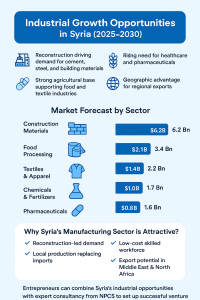The Syrian economy has faced innumerable challenges over the years, yet entrepreneurs can still establish small-scale manufacturing in Syrian enterprises. Such businesses can help significantly rebuild the economy while also creating job opportunities. Business opportunities in Syria with regard to profitable industries in Syria and strategies for success in the manufacturing sector.
This article explores profitable manufacturing business ideas in Syria, outlines the country’s industrial outlook, provides insights into sector-specific demand, and highlights potential manufacturing processes. It is designed to help startups, local entrepreneurs, and international investors who are evaluating opportunities in this region.
Overview of Syria’s Industrial Landscape
Syria is known for its long history of industrial activity. Manufacturing had been a foundation of the economy of Syria. While many fields have been disturbed by the recent political conflicts and economic instability, some have shown signs of resilience. Entrepreneurs can find small-scale manufacturing in Syria using locally available resources while serving domestic and regional markets.
Why Manufacturing in Syria Matters
Manufacturing is a key piece of Syria’s rebuilding plan. Factories turn raw goods into value, boost national income, and provide jobs so that communities can recover. Deepening manufacturing in Syria builds on these key advantages:
Rebuilding Demand: The war has left behind a huge call for bricks, plates, steel, and equipment to rebuild housing, schools, and roads. Factories that provide these goods will help replenish destroyed markets.
Farm Base: Between the Euphrates and the coastal mountains, farmers grow wheat, cotton, and olives. The pulp, yarn, and oils from these products power a strong food and textile manufacturing base.
Geographic Advantage: Syria sits on the ancient caravan roads linking Europe, Africa, and Asia. Good roads and rail could turn the country into a major export platform for neighboring markets searching for reliable products.
Experienced Craftsmen: Old cities like Aleppo and Homs have built on centuries of skills in weaving, ceramics, and light engineering. Recent disruptions have not erased this talent; it paves the way for clean, small- and medium-sized factories poised to restart economy.
Related: Exploring Business Opportunities in Syria
Government and Market Outlook
While Syria’s political and economic challenges are ongoing, gradual rebuilding is creating significant manufacturing demand. International organizations and reconstruction efforts are also channeling resources into critical sectors.
Market Forecast (2025–2030)
| Sector | 2025 Market Value (USD Bn) | CAGR (2025–2030) | 2030 Projected Value (USD Bn) |
|---|---|---|---|
| Construction Materials | 3.5 | 12% | 6.2 |
| Food Processing | 2.1 | 10% | 3.4 |
| Textiles & Apparel | 1.4 | 9% | 2.2 |
| Chemicals & Fertilizers | 1.0 | 11% | 1.7 |
| Pharmaceuticals | 0.8 | 14% | 1.6 |
The reconstruction-driven demand for building materials, coupled with Syria’s agricultural base and population needs, makes these industries particularly promising for entrepreneurs.

Key Manufacturing Sectors
Below are some of the most promising small-scale opportunities for profitable industries in Syria:
- Textiles and clothing
- Food processing
- Chemical Products
- Construction materials
- Handicrafts.
They meet the demand of the local market and have the export potential, thereby making them ideal for entrepreneurs considering business opportunities in Syria.
Promising Small-Scale Manufacturing Business Ideas
1. Textile and Garment Production
Textiles have been one of the pillars of the Syrian economy for long ago. Hence, there will be a growing demand for clothing and fabrics as well as traditional Syrian garments. Niche local markets, such as traditional Syrian designs, promise for small-scale units addressing quality products, and these will stand out.
Key Opportunities:
- Local production of fabrics
- Exporting traditional Syrian textiles
- Custom garments manufacturing
2. Food Processing
In Syria, food processing is considered small-scale manufacturing of great importance. It has very fertile agricultural produce from which it can supply a lot of raw materials for the processing industries. Potential Products:
- Olive oil production-inherited olive oil: Much about Syria has been learned from its olive oil heritage.
- Dairy production: Manufacturing cheese, yogurt and butter for domestic consumption.
- Canned fruits and vegetables: Make the products last longer for the domestic and export markets.
- Baked items: Offer traditional Syrian pastries and bread.
3. Soap and Cosmetics Manufacturing
Syria produces famous soap products, especially Aleppo soap, which people make from natural ingredients like olive oil and laurel oil. Small-scale manufacturing in Syria Of soap and cosmetics can be expanded in the short run. It currently satisfies a bit of the growing demand for organic and chemical-free products.
Main Benefits:
- Local access to raw materials
- High global demand for natural products
- Potential for Export to niche markets
4. Furniture Making
The woodworking and furniture industry of Syria has a long-established tradition. Small-scale manufacturing in Syria units specializing in modern and traditional designs may serve home and overseas markets alike.
Business Opportunities:
- Custom-made furniture for homes and offices
- Export of handcrafted wooden furniture
- Restoration and repair services
5. Plastic Products Manufacturing
Plastic items in common include household goods and packaging materials, and the demand for these is steady. Setting up a small-scale manufacturing unit in Syria for plastic products can be one of the biggest profitable business ideas.
Key Products:
- Plastic containers and utensils
- Packaging for food and industrial products
- Recycled plastic items
Related: How to Start a Plastic Waste Recycling Business: A Comprehensive Guide
Challenges and Considerations
Establishing a small-scale manufacturing in Syria is not without challenges, such as:
- Fluctuation economy: Currency fluctuation and inflation affect the cost
- Infrastructure development: Limited utility and transport access
- Financing access: Difficulties may arise in obtaining loans and/or investments
- Import/export limitations: Trade barriers may limit access to markets.
Yet, local markets combined with their skilled labor can help entrepreneurs a lot to further their goals.
Steps to Start a Small-Scale Manufacturing Business in Syria
These are the steps to follow for business opportunities in Syria:
1. Research the Market
Determine a promising product niche from a market demand, competition, and resource perspective.
2. Develop a Business Plan
Draft and submit a production process and budget cost plan and marketing strategies.
3. Obtain Necessary Permits
Comply with local regulations through obtaining relevant permits and licenses.
4. Choose a Suitable Location
Find a location preferably cheap where raw materials, labor, and transportation networks are available.
5. Source Equipment and Materials
Invest in affordable machinery and good raw material suppliers.
6. Hire and Train Workers
Employ skilled labor and train them for quality production.
7. Establish Distribution Channels
Build some partnerships with local retailers, wholesalers, and export agencies to let your products reach wider distribution.
Why Invest in Small-Scale Manufacturing in Syria?
Another important thing about small-scale manufacturing in Syria is that:
- It takes less initial investment than large industries at startup.
- Demand is very high for locally manufactured products.
- They are opportunities for niche products to find export markets.
- It can contribute to the national economy, restoration, and job creation.
Entrepreneurs can find a place where they can set up small-scale businesses and become viable, contributing to their whole economy’s well-being.
Build your dream business: Start a project in Syria
Future Outlook for Small-Scale Manufacturing
As Syria moves towards economic recovery, the manufacturing sector is expected to play a crucial role. The government and international organizations are likely to support initiatives that create employment and boost production. Entrepreneurs who invest in small-scale manufacturing now will be well-positioned to benefit from future growth.
For more information, check out our related video
Role of NPCS in Supporting Entrepreneurs
Success in launching a new factory requires a well-formed plan. That is where the Niir Project Consultancy Services (NPCS) adds value:
- NPCS carries out comprehensive market and techno-economic feasibility documents, covering successful manufacturing processes, raw materials, and plant layouts.
- The report outlines typical raw goods, equipment needs, manpower levels, and investment timelines.
- NPCS experts counsel every businessman on the economic feasibility of launching fresh firms in Syria and other emerging markets.
By pairing tailored professional insight with freshly opened local markets, these experts help entrepreneurs bring projects on budget and to market quickly, ensuring that new factories can achieve profit without unnecessary surprises.
Discover the Right Business for You With Our Startup Selector Tool
Conclusion
There are numerous commercial opportunities created by small-scale production lines in Syria. While the economy of Syria is faced by harsh conditions, small-scale manufacturing in Syria ventures make viable business opportunities in Syria. Focusing on various sectors such as textiles, food processing, soap making, furniture making, and plastic products may offer sustainable and profitable industries in Syria.
Success, careful planning, market research, and then resilience are required. With the right approach, small-scale manufacturing businesses can thrive and contribute to the nation’s economic recovery, providing much-needed jobs. New entrepreneurs should capitalize on these opportunities to become part of Syria’s reconstruction from war.







